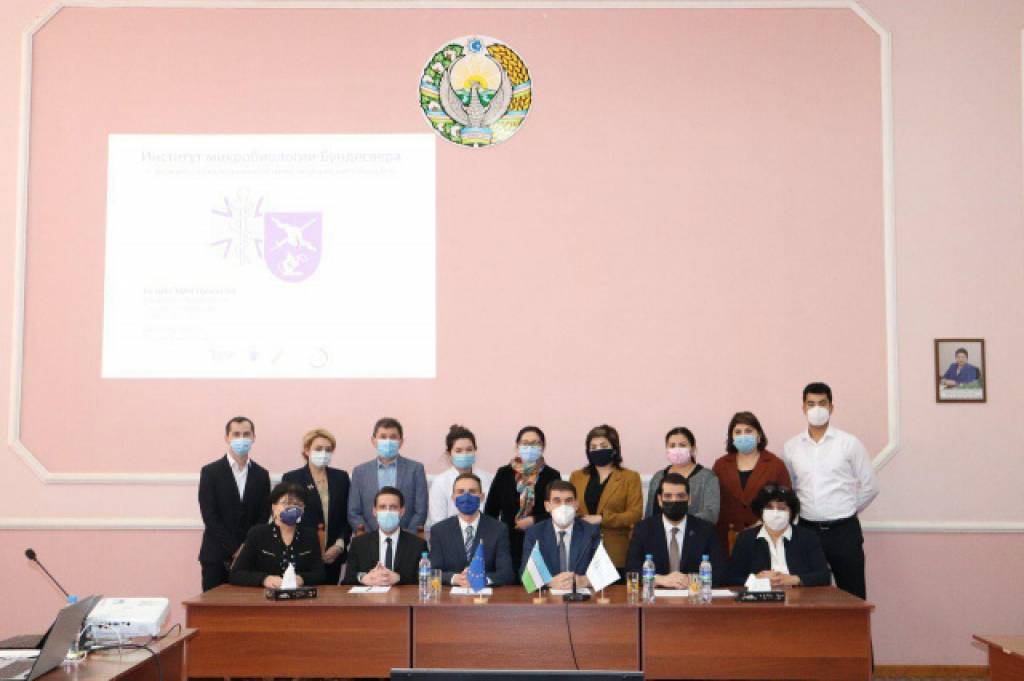German Bundeswehr experts visit Uzbekistan

German experts from the Bundeswehr Institute of Microbiology visited Uzbekistan 15-22 October 2020 as part of the effort under EU CBRN CoE Project 53 to provide two diagnostic mobile laboratory units to Uzbekistan.
German experts from the Bundeswehr Institute of Microbiology visited Uzbekistan 15-22 October 2020 as part of the effort under EU CBRN CoE Project 53 to provide two diagnostic mobile laboratory units to Uzbekistan. These laboratories will aid Uzbekistan in increasing its capacities to the response of disease outbreaks. As part of this visit, discussions were held on practical issues, such as delivery of the laboratory units to Uzbekistan, scheduling of four training workshops and two field exercises during the coming years as well as other related issues.
Additionally, this meeting provided the opportunity for the German experts to meet the Uzbek experts, that will run the mobile labs in the future, from the two recipient institutes, Research Institute of Virology (RIV) and Research Institute of Epidemiology, Microbiology and Infectious Diseases (RIEMID), both under the Ministry of Health of the Republic of Uzbekistan. During the first theoretical mini-workshop, the basic methodology of the mobile lab was discussed and the level of knowledge of the Uzbek experts assessed, which now allows the detailed set-up of the further training plan.

Based on the discussions held, the intention was expressed to deliver the two mobile laboratory units in the 1st quarter of 2021 and provide two workshops on the basics, running and maintenance of the mobile labs. Subsequently in 2021 and 2022, more practical trainings and field exercises are planned.
The Head of the Regional Secretariat for Central Asia Mr Gulyamov informed that the provided mobile laboratories will also be used to conduct research and scientific work on methodology of detection of different types of diseases and other biological risks. “The delivery of the mobile laboratories is expected in January next year, and the capacity of both institutes – recipients of the laboratories – the Institute of Epidemiology and the Institute of Virology, will be significantly expanded’, noted Mr Gulyamov.

The Project Manager from the Bundeswehr Institute of Microbiology for this effort, Mr. Gerald Zikeli, stated that “Mobile laboratory units are an effective and well-established measure to expand diagnostic laboratory capacities during outbreak situations, especially in sight of the current global COVID-19 pandemic, and that Bundeswehr Institute of Microbiology is looking forward to implement this project together with both Uzbek institutes”.
The Team Leader from the International Science and Technology Center, Mr. Hendrik Visser, expressed his “appreciation of the great cooperation between Uzbek partners and the Institute of Microbiology to enhance disease diagnostic capabilities that can be utilised in remote regions in Uzbekistan, which all is made possible with the support from the European Union”.
The two mobile labs and associated trainings are provided through EU CBRN CoE Project 53, which is implemented by the International Science and Technology Center (ISTC). Project 53 was conceived and funded within the framework of the EU CBRN CoE (www.cbrn-coe.eu) initiative. The CoE currently covers 8 regions and 61 partner countries. The EU CBRN CoE Secretariat for Central Asia is based in Tashkent, Uzbekistan. It works in partnership with countries to encourage local ownership of CBRN action plans, policies and joint preparation of regional project proposals. The ISTC (www.istc.int), implementer of Project 53, has funded and managed several hundred projects in Central Asia over the past 20 years.

Background Information
The EU CBRN CoE Initiative is funded by the European Union and implemented in cooperation with the United Nations Interregional Crime and Justice Research Institute (UNICRI) and the European Commission Joint Research Centre (JRC). The initiative is developed with the technical support of relevant international and regional organizations, the EU Member States, and other stakeholders, through coherent and effective cooperation at the national, regional and international level. The initiative involves over 60 countries in eight regions of the world.

Press Service of the State Committee on Industrial Safety